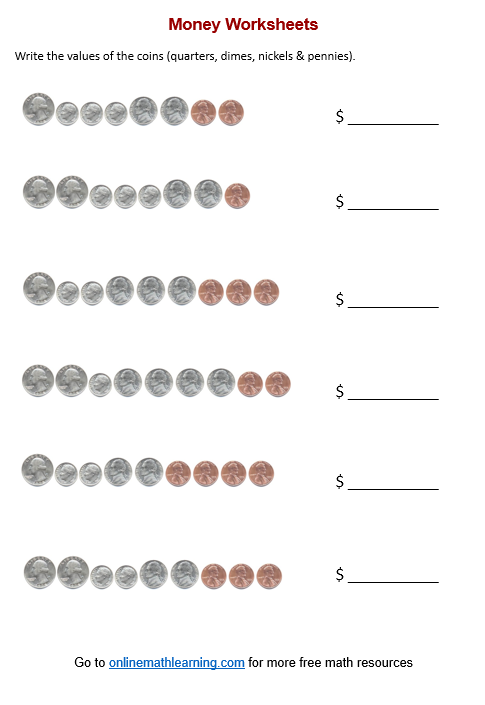Counting Quarters, Dimes, Nickels, & Pennies Worksheets
Related Pages
Math Worksheets
Lessons for First Grade
Free Printable Worksheets
There are eleven sets of money worksheets:
- Counting Pennies
- Counting Nickels
- Counting Dimes
- Counting Quarters
- Counting Half Dollars
- Counting Nickels, Pennies
- Counting Dimes, Pennies
- Counting Dimes, Nickels, Pennies
- Counting Quarters, Dimes, Nickels, Pennies
- Value of Coins (Coins given in words)
- Money Word Problems
Counting Quarters, Dimes, Nickels, & Pennies Worksheets
In these free math worksheets, students learn to count quarters, dimes, nickels & pennies and convert to cents.
How to count quarters, dimes, nickels & pennies?
Counting quarters, dimes, nickels, and pennies involves understanding the value of each coin and combining them to represent different amounts. Here’s a step-by-step guide on how to teach counting these four types of coins:
Introduction to Quarters, Dimes, Nickels, and Pennies:
Start by introducing each coin separately. Show pictures or real examples of quarters, dimes, nickels, and pennies. Explain the characteristics of each coin and their values:
Quarter: 25 cents
Dime: 10 cents
Nickel: 5 cents
Penny: 1 cent
Counting by Coin Values:
Teach students to count by the values of each coin. For example:
Counting by ones for pennies
Counting by fives for nickels
Counting by tens for dimes
Counting by 25s for quarters
Grouping Coins:
Introduce the concept of grouping coins. Explain that certain combinations of quarters, dimes, nickels, and pennies can make specific amounts. For example:
Four quarters equal 1 dollar
Two dimes equal 20 cents
A quarter and a nickel equal 30 cents
Hands-On Activities:
Provide students with sets of mixed coins and encourage them to count and group them. Use hands-on activities like sorting or creating “money towers” with quarters, dimes, nickels, and pennies.
Counting in Context:
Create real-life scenarios for counting all four types of coins. For instance, if an item costs a certain amount, ask students to figure out how many quarters, dimes, nickels, and pennies they need to pay for it.
Counting with Objects:
Incorporate everyday objects or drawings to create counting scenarios. For example, draw a picture of a snack priced at 47 cents and ask students to use quarters, dimes, nickels, and pennies to reach that amount.
Simple Addition and Subtraction:
Introduce simple addition and subtraction using quarters, dimes, nickels, and pennies. For example, “If you have three quarters, two dimes, four nickels, and three pennies, how much money do you have?”
Play Games:
Create coin-counting games specifically focusing on quarters, dimes, nickels, and pennies. Games like “Coin Sorting Races” or “Shopping with Coins” can make learning fun.
Counting with Songs:
Use counting songs or rhymes that involve all four types of coins. Create catchy tunes or actions to engage students in the learning process.
Reinforcement:
Provide positive reinforcement and praise when students successfully count these coins or solve counting problems involving them.
Review and Practice:
Regularly review and practice counting quarters, dimes, nickels, and pennies to reinforce the concept. Use diverse activities to maintain engagement.
Have a look at this video if you need to review how to count quarters, dimes, nickels & pennies.
Click on the following worksheet to get a printable pdf document.
Scroll down the page for more Counting Quarters, Dimes, Nickels, & Pennies Worksheets.
More Counting Quarters, Dimes, Nickels, & Pennies Worksheets
Printable
(Answers on the second page.)
Counting Quarters, Dimes, Nickels, & Pennies Worksheet #1
Counting Quarters, Dimes, Nickels, & Pennies Worksheet #2
Counting Quarters, Dimes, Nickels, & Pennies Worksheet #3
Online
Count & Convert Coins (eg. 3 quarters, 2 dimes, 1 penny = ___ cents)
Money Word Problems
Related Lessons & Worksheets
Try out our new and fun Fraction Concoction Game.
Add and subtract fractions to make exciting fraction concoctions following a recipe. There are four levels of difficulty: Easy, medium, hard and insane. Practice the basics of fraction addition and subtraction or challenge yourself with the insane level.

We welcome your feedback, comments and questions about this site or page. Please submit your feedback or enquiries via our Feedback page.
